RELIC Meeting
Guest Lecture by Dr. McComb-Sanchez
Guest Lecture by Dr. McComb-Sanchez
Watch Party (content TBD)
Guest Lecture
Fall 2024
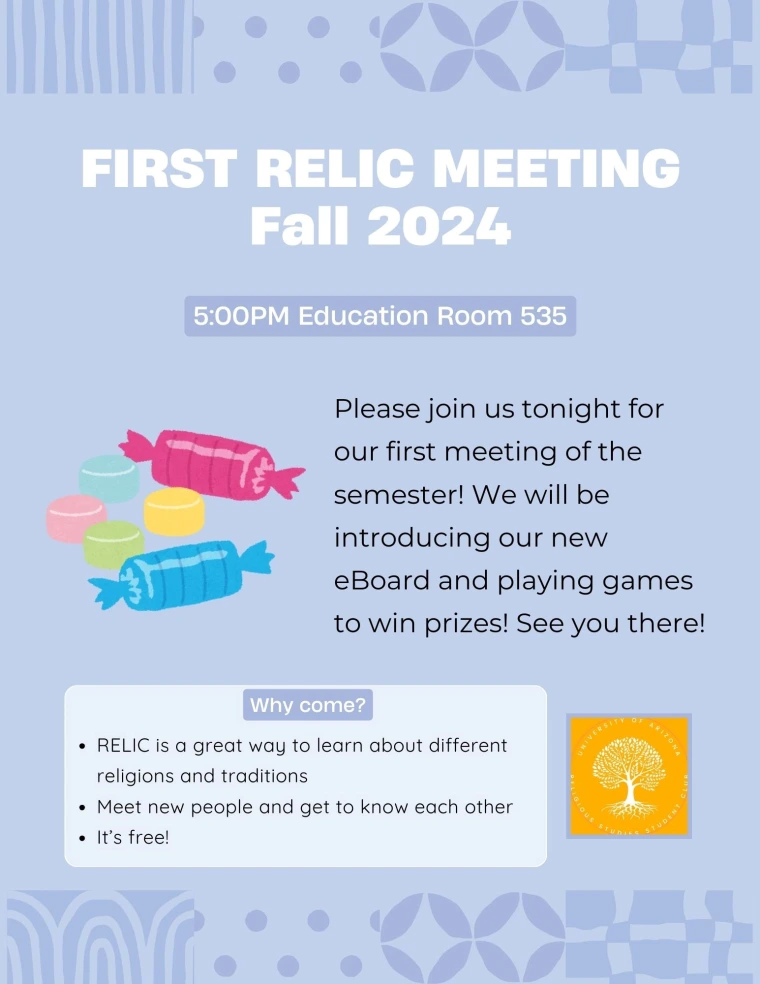
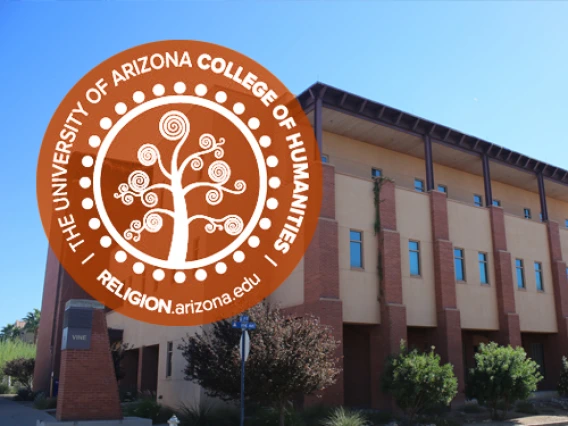
Religious Studies offers need-based funding for upper-level majors in Religious Studies and Religious Studies for Health Professionals who are facing financial challenges in completing their degree. These scholarships can help cover tuition and other educational expenses for majors who are facing acute financial difficulties. Applications are reviewed on a rolling basis throughout the year.
PLEASE NOTE:
Please note that the number and size of the awards will be determined by the Department of Religious Studies and Classics after reviewing applications.
In 1978, Lionel England “Lee” Rombach donated funds to Religious Studies at the University of Arizona for the purpose of supporting upper-level undergraduates pursuing the study of religion. He endowed this scholarship in memory of his parents, Lambert Rombach and Anna England Rombach. For nearly half a century, the Rombach Scholarship has been distributed to Religious Studies majors to help with their educational expenses. Until the end of his life, Lee Rombach enjoyed luncheons each year with recipients of the Rombach Scholarship. Mr. Rombach passed away in 2008 at the age of 93, and his legacy continues to benefit students at the University of Arizona. His obituary can be read here.
In the 1980s, Religious Studies received a generous donation to establish this endowed scholarship from the estate of Ora Bretall. She was predeceased by her son, Dr. Robert Bretall (1913-1980), who was a faculty member at the University of Arizona from 1949-1976.
I am staying at University of Arizona for an MA in Art History starting this fall. After that I want to get a PhD either in Art History or in Religious Studies. My degree in Religious Studies has pointed the way to some unique enquiries at the intersection of art and religion and modernity.

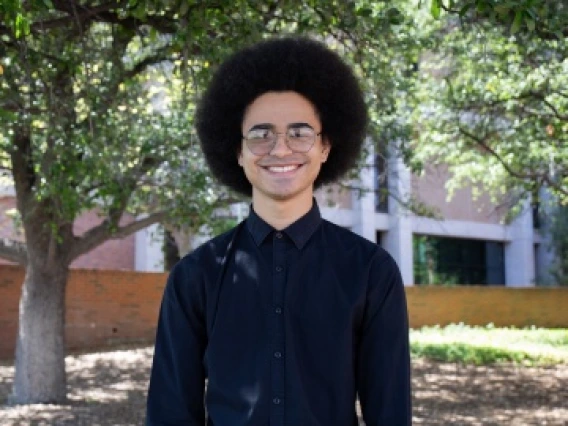
Congratulations to the College of Humanities’ Outstanding Senior for Spring 2024, Mason Maltbie!
Maltbie graduates with a 4.0 GPA, triple majoring in Religious Studies, Russian, and Creative Writing.
“Through speaking new languages, forming deeper understandings of others, and visiting places once locked behind the pages of literature, we’ve translated ourselves into the world and come to know people from worlds quite different from ours,” Maltbie told fellow Humanities graduates at Saturday’s convocation. “The true spirit of the Humanities is knowing that the ‘other,’ no matter how seemingly distant, feels and struggles just like you.”
Maltbie served for two years as president of the Slavic and Eurasian Studies Club and received myriad awards over the course of his studies: the SILLC Global Award, the B.G. Thompson, Jr. Study Abroad Award, the Donna Swaim International Award for Religious Studies, a Rombach/Bretall Scholarship, the Donna Dillon Manning and Larry Horner Endowed Humanities Award for Study Abroad, and the Fearless Inquiries Abroad Scholarship.
Maltbie’s honors thesis for Religious Studies explored how structural forces of poverty and historic discrimination influence gang violence and formation, and how an interdisciplinary approach utilizing psychology, sociology and Religious Studies can help understand the issues and lead to policy reforms.
Maltbie studied abroad in Astana, Kazakhstan in 2023 and will be studying abroad at the School of Russian and Eurasian Studies in Uzbekistan during the summer of 2024.
“Mason's academic journey showcases his exceptional qualities and achievements, and his relentless pursuit of knowledge and his deep-seated desire for immersive cultural experiences,” wrote Assistant Professor Liudmila Klimanova, who led the Kazakhstan program. “The fervor and depth with which he engaged in this program were profoundly inspiring, not only to me but also to our esteemed colleagues at Eurasian National University in Kazakhstan.”
“Mason embodies the qualities of an outstanding senior: academic excellence, leadership, and a deep commitment to embracing the humanities and fostering understanding across cultures and communities.”
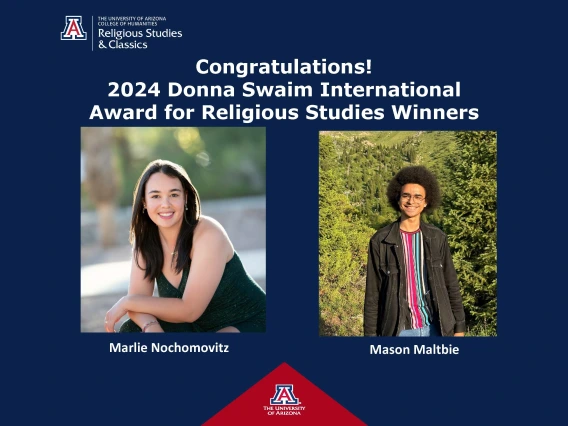
The Department of Religious Studies and Classics is happy to announce the recipients of the 2024 Donna Swaim International Award for Religious Studies.
Mason Maltbie is a Religious Studies major, and he is also majoring in Russian and Creative Writing. Mason will be studying abroad at the School of Russian and Eurasian Studies in Uzbekistan during the summer of 2024.
Marlie Nochomovitz is a Religious Studies for Health Professionals (RSHP) major, as well as a Physiology and Medical Sciences Major. Marlie will be studying abroad in London during the Spring 2025 semester.
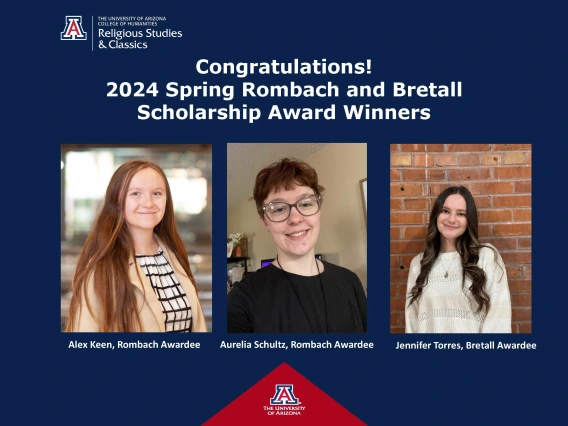
The Department of Religious Studies and Classics is happy to announce the winners of the 2024 Spring Lionel Rombach and Ora Bretall Scholarship Awards.
Awardee for the Ora Bretall Scholarship is: Jennifer Torres.
Awardees for the Lionel Rombach Scholarship are: Alex Keen and Aurelia Schultz.
Congratulations to our outstanding majors in Religious Studies (BA) and Religious Studies for Health Professionals (BS)!
Read (in their words) how majoring in Religious Studies & RSHP has enriched their lives and studies:
Jennifer Torres:
I decided to major in Religious Studies because I love how the academic study of religion highlights different perspectives. The Religious Studies courses I’ve taken at University of Arizona have been deeply transformative experiences. The best parts about Religious Studies classes are the exploration into the meaning of human existence, as defined by different faiths, and the richness that comes from studying spirituality. The professors in this department are extremely dedicated teachers and mentors to their students. Since I am double majoring in Law, I hope to use my training in Religious Studies to advocate for social justice and engage with diverse perspectives.
Alex Keen:
I’m an aspiring clinical psychologist interested in developing and implementing integrative approaches to the treatment of both physical and mental health. I began my undergraduate career with my neuroscience major, which required the completion of a chosen emphasis. Although the prescribed choices were interesting, none of them quite fit my goals. So, I decided to develop my own. The purpose of neuro-spirituality is to learn how religiosity and spiritual concepts can be integrated with modern medicine in order to improve quality of life. My religious studies major has given me the opportunity to develop my “humanities brain”, which has provided me with a better understanding of people and the curiosity to explore holistic avenues. I’m so grateful to have the opportunity to harmonize religion with science, because both disciplines offer valuable perspectives to the well-being of the body, mind and soul.
Aurelia Schultz:
I grew up in a house without religion. We were not allowed to go to church or participate in any religious ceremonies. When I entered high school, I got to observe all of my friends fully invested in their religions and they often would invite me to participate in various religious ceremonies with them. I participated in numerous Catholic, Morman, and Hindu ceremonies, the Hindu ones being by far my absolute favorite and helping to spark my interest in the religious studies of Hinduism. Being able to major in Religious Studies for me means that I am able to study something that I actually enjoy learning about. So far I have studied the different deities and demons in Southern Asia and ignited my passion for studying religion, I have learned about the different ways that religion can influence violence and opened my eyes to the different biases in the media, I have learned about Indigenous American Religions and learned more about spirituality and healing than ever before, and finally I have taken a class about the afterlife, and
learned that there are hundreds of different ways that the afterlife can help ease the people’s anxiety about death.
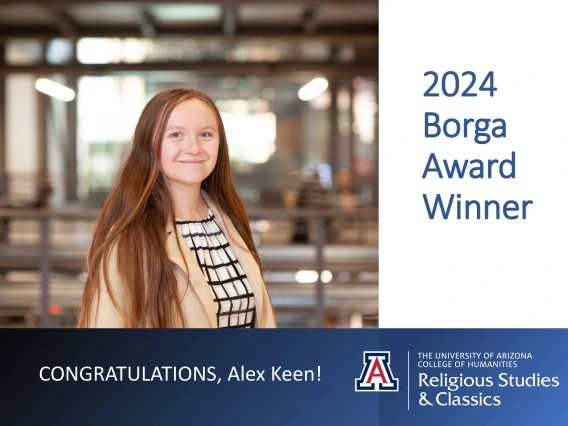
The Fred and Barbara Borga Award was established in honor of Fred and Barbara Borga through the generosity of their son Dr. Ross Schwartzberg. The award supports outstanding undergraduate students at the University of Arizona who are majoring in Religious Studies with a concentration in Religious Studies for Health Professionals.
Religious Studies is thrilled to announce the following winner of the Fred and Barbara Borga Award:
Alex Keen: "I’m an aspiring clinical psychologist interested in developing and implementing integrative approaches to the treatment of both physical and mental health. I began my undergraduate career with my neuroscience major, which required the completion of a chosen emphasis. Although the prescribed choices were interesting, none of them quite fit my goals. So, I decided to develop my own. The purpose of neuro-spirituality is to learn how religiosity and spiritual concepts can be integrated with modern medicine in order to improve quality of life. My religious studies major has given me the opportunity to develop my 'humanities brain', which has provided me with a better understanding of people and the curiosity to explore holistic avenues. I’m so grateful to have the opportunity to harmonize religion with science, because both disciplines offer valuable perspectives to the well-being of the body, mind and soul."